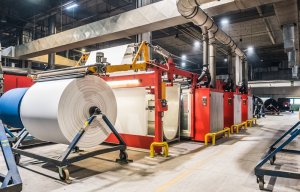
Klopman enters South African market
Using work clothes made with eco-friendly fabrics brings benefits to the environment by significantly reducing energy usage, emissions and waste.

21st January 2019
Innovation in Textiles
|
Frosinone
Klopman, a leading European producer of workwear fabrics, has defined 5 reasons why a company should choose work garments produced with environmentally friendly fabrics.
“Klopman is strongly aware of the importance of promoting the circular economy and sustainability in the textile sector. It has therefore created a very innovative green range - made of recycled plastic bottles, wood pulp, organic cotton or cotton certified according to Faitrade or BCI (Better Cotton Initiative) standards – to improve the conditions of producers in developing countries,” the company said in a press statement today.
“It’s a decision of great importance for a company that produces more than 42 million metres of fabrics per year. In fact, cotton uses 2.5% of the cultivated land in the world but consumes 16% of pesticides. On the other hand, using environmentally friendly polyester means giving new life to a plastic bottle that would take about 1000 years to disappear, and saves 45% of energy, 20% of water and 30% of emissions in fibre production compared to normal polyester.”
5 reasons to choose workwear made with green fabrics
The company sets out its 5 reasons as follows:
More energy for the planet
“To produce a ton of plastic, 900 litres of oil, 180 cubic metres of water and 14 thousand kilowatt hours of energy are needed. For a ton of recycled plastic, instead, 2 tons of used plastic, 1 cubic metre of water and 950 kilowatt hours of energy are enough.
Less plastic pollution in the seas
According to World Wildlife Found - WWF[i] data, plastics represent 95% of offshore waste found on the seabed and on the beaches of the Mediterranean. Europe, the second largest producer of plastic in the world after China, pours out between 150 and 500 thousand tons of plastic at sea each year. Encouraging and promoting the adoption of recycled plastic allows us to limit its release into the environment.

To produce a ton of plastic, 900 litres of oil, 180 cubic metres of water and 14 thousand kilowatt hours of energy are needed. For a ton of recycled plastic, instead, 2 tons of used plastic, 1 cubic metre of water and 950 kilowatt hours of energy are enough. © Klopman International.
Economic benefit for the country
According to the COREPLA[ii] Green Economy Report (Italian National Consortium for the collection, recycling and recovery of plastic packaging), in 2017 43.4% of the plastic packaging collected was recycled; and between 2005 and 2017, the packaging recycled grew exponentially, by 64%, bringing Italy an economic benefit of over 2 billion euros on the raw material not consumed, the production of energy and on reduced CO2 emissions. Using eco-friendly garments increases the benefits of recycling plastic.
Minor consumption of greenhouse gas and water
According to the first international study on Life Cycle Assessment (LCA) of organic cotton promoted by TE (Textile Exchange, a non-profit organisation that promotes a sustainable textile industry)[iii], the positive effects of organic cotton are numerous: 46% reduction of climate-altering gas emissions; 70% reduction in emissions responsible for acidification; 91% reduction in water consumption mainly for irrigation (excluding rainwater); 26% reduction of eutrophication, ie the excessive enrichment of nutrients of the ecosystem; 62% reduction in primary energy consumption. The study was conducted on data from countries such as India, Turkey, Tanzania, the United States and China, which account for 97% of the world's organic cotton production.
Linking quality and respect for the environment
Choosing a workwear garment produced with eco-friendly fabrics does not mean giving up quality. Thanks to the advanced focus on materials and production techniques, adopting a garment made of green fabrics guarantees – for companies and the workers who wear it - comfort, quality and, above all, durability with substantial consequent cost savings.”
Klopman International
Klopman International s.r.l. has been a European leader in the production and marketing of technical fabrics for workwear for over 50 years, with three business areas dedicated to the different fields of application: Workwear, Protectivewear and Corporatewear.
Klopman has its headquarters and production site in Frosinone, Italy, with a plant covering 70,000 square metres, approximately 400 employees, an annual production of 42 million metres of fabric and a turnover of 138 million euro. The CEO, Alfonso Marra, recently launched a global expansion plan which saw the company, which has commercial branch offices in Dusseldorf, Lyon, Moscow, Borås (Sweden), Dubai and Bangkok, opening another production site in Jakarta to serve the Asian market directly.
In addition to the ISO 9001:2008 certification, Klopman works in compliance with European quality management standards and is BS EN ISO 14001:2004 and BS OHSAS 18001:2007 certified. Klopman also recently obtained the maximum level (class 3) of the STeP - Sustainable Textile Production certification. Klopman fabrics are certified Oeko-Tex 100.

Business intelligence for the fibre, textiles and apparel industries: technologies, innovations, markets, investments, trade policy, sourcing, strategy...
Find out more